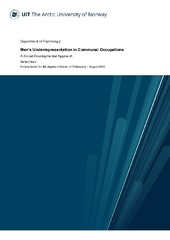Abstract
This dissertation addresses psychological factors that contribute to the underrepresentation of men in communal occupations (i.e., occupations associated with communal traits, e.g., nurse), based on the theoretical perspectives from the developmental theory of occupational aspirations (Gottfredson, 1981) and the model of achievement-related choices (Eccles et al., 1983). The underrepresentation of men in communal occupations is an important but underexamined aspect of gender inequality in the workforce, as there is an increasing need for workers in communal fields, and there are important individual and societal benefits of communal engagement for men. As the gender gap in the workforce is reflected in the gendered occupational aspirations of young children, we investigated this issue by using a social developmental approach. We conducted four empirical studies and report the results in three papers. In Paper I of this dissertation, we investigated the factors influencing communal occupational aspirations in early-to middle childhood and found that children’s communal occupational aspirations were associated with their occupational gender stereotypes, their gendered self-perceptions and perceived status of communal occupations. In Paper II, as a follow up to the results regarding occupational status in Paper I, we conducted an experimental study and found evidence for a causal link between occupational status and occupational aspirations among both male and female elementary school children. However, additional correlational analyses showed that boys reported more agentic self-perceptions, which were related to a stronger valuation of occupational status. Lastly, in Paper III, we investigated the influence of the gendered self-concept and perceived fit on the sense of belonging and dropout intentions of students in communal degree programs and found that male students have more agentic self-perceptions than female students, which was associated with less perceived fit and less sense of belonging, as well as higher dropout intentions from their communal degree program. The consistent effects of gendered self-perceptions as well as the causal effects of occupational status on occupational aspirations indicate that future interventions that aim to increase men’s communal occupational aspirations should emphasize how communal occupations can afford agentic values, as well as promoting the status of communal occupations.
Has part(s)
Paper I: Olsen, M., Olsson, M.I.T., Parks-Stamm, E.J., Kvalø, M., Thorsteinsen, K., Steffens, M.C. & Martiny, S.E. (2022). What do I want to be? Predictors of communal occupational aspirations in early to middle childhood. International Journal of Behavioral Development, 46(6), 528–541. Also available in Munin at https://hdl.handle.net/10037/27518.
Paper II: Olsen, M., Parks-Stamm, E.J., Thorsteinsen, K. & Martiny, S.E. (2023). Salary and power: How occupational status affects children’s occupational aspirations. Journal of Experimental Child Psychology, 232, 105667. Also available in Munin at https://hdl.handle.net/10037/30170.
Paper III: Olsen, M., Parks-Stamm, E.J., Lund, I.M.H. & Martiny, S.E. Who cares? Effects of gendered self-perceptions on dropout intentions in communal studies. (Submitted manuscript). Now published in Journal of Community & Applied Social Psychology, 2023, available at https://doi.org/10.1002/casp.2745.


 English
English norsk
norsk
